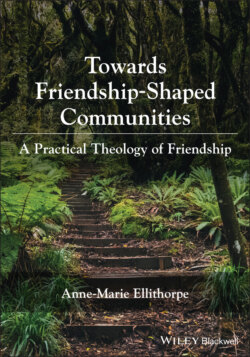Читать книгу Towards Friendship-Shaped Communities: A Practical Theology of Friendship - Anne-Marie Ellithorpe - Страница 17
Part III: Friendship, Theology, and the Social Imagination
ОглавлениеThe third phase of this research explores the relevance of the normative work (Part II) to the descriptive work (Part I) and further develops core normative ideals. This is not a simple application of the past to the present, but rather involves the examination of large encompassing themes and trends. The systematic stage includes gaining a comprehensive understanding of ideals that have emerged from the normative task, ideals that are typically conveyed in narratives and metaphors.80 Consideration is given to revisions in practice and understanding that may be provoked through the fusion of horizons.
While we may never entirely understand our own situation, that part of our situation of which we do have awareness may be described as a horizon. Systematic theology, according to Browning, is the fusion of horizons between the vision of reality implicit within contemporary practices and the vision of reality inherent within normative Christian texts.81 Browning’s contrast between two visions is helpful yet oversimplified. The horizon of the past has already impacted the present and thus impacted us. Texts of the past are already assimilated in various ways into contemporary understandings and practices; they have already had some impact on us as interpreters. We cannot understand the horizon of the past on its own terms, because we cannot leave ourselves behind.82
Further, the fusion of horizons is an ongoing process. Our horizons are never static, but rather move due to changing conditions and provoke new questions to be asked.83 Nor are present or historical horizons ever isolated. Old and new are continually “combining into something of living value”84 in an ongoing process of fusion. Our present horizon is where understanding begins. In the to and fro of dialogical interactions between texts throughout this research, the fusion of horizons does not imply the giving up of one horizon for the sake of another.85 Rather, horizons are brought together in a dialogical relationship through a dialectical process of give and take, question and answer, and seeking to understand the perspectives of others.86 Within this research, the fusion of horizons through mutually critical dialogue takes place between theological sub-disciplines (including biblical, historical, and spiritual theology), as well as with non-theological disciplines.
Chapter 6 explores themes of relationality, mutuality, and friendship in relation to doctrines of God and creation, and draws on functional and relational understandings of the imago Dei motif. Chapter 7 explores themes of mutuality, open friendship, and the human vocation in relation to pneumatology, Christology, and ecclesiology, highlighting ways in which theology may contribute to fostering an imagination that promotes friendship in its various forms. The relationship between friendship and love, and the formative potential of friendship, are explored within Chapter 8. Friendship is affirmed as a school of love, and thus also of hospitality, freedom, and wisdom. Spirit-shaped friendships and friendship-shaped communities have the potential to reflect the character of God, and to shape us in the way of God.
